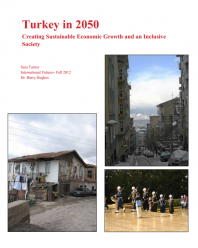
Turkey in 2050: Creating Sustainable Economic Growth and an Inclusive Society

Executive Summary
By some measures of development, Turkey is doing exceedingly well. In the last thirty years it has dramatically improved its economic and development profile and has begun to address some of the governmental deficits that have made developed European countries wary of Turkish membership in the European Union. The most recent update on Turkey’s progress towards the Millennium development goals showed significant improvement on a number of measures including child mortality, progress towards universal education, and reductions in maternal mortality. These reforms have been driven in part by Turkey’s continuing efforts to join the European Union, which have been ongoing since they first applied to the European Economic communities (EEC) in 1959. Particularly since the late 1980s, the need to harmonize Turkish institutions with EU ones have reinforced and locked in reforms in almost every area imaginable (Togan, 2004, p. 1016).
Nevertheless, challenges remain. The government of Turkey has identified 5 key areas to emphasize in future government programs: increasing competitiveness, increasing employment, strengthening human development and social solidarity, ensuring regional development and increasing the quality and effectiveness of public services (Republic of Turkey, 2006, p. 14). Development agencies like the World Bank and IMF have also offered suggestions for Turkish policymakers that emphasize the need to increase women’s visibility in employment, and increasing domestic savings and investment to help buffer Turkey against international capital flows. This paper selects two major targets for policy reform: promoting sustainable economic growth based on increased productivity and domestic investment, and increasing participation by marginalized groups in public political and economic life. Our model uses policy reforms in infrastructure, education, private investment, gender empowerment and government effectiveness to increase both the potential for economic growth and enhance the inclusiveness of Turkish society. The effectiveness of our interventions demonstrates that there is a significant positive feedback loop that develops between these indicators, prompting improvement in a wide variety of indicators over the forecast period. Turkey has made great strides, and is only now beginning to come into its full power politically and economically. The purpose of this paper isto analyze the prospects for Turkey to maintain its developmental momentum and to assess the progress in addressing potential pitfalls to continued development. Some of the recommended policy changes in this report are already being implemented, which means that this report is as much about identifying impacts and feedback loops as it is about recommending areas for developmental focus.
- Issues:
- Infrastructure, Health, Demography, Urbanization and Migration, Economics, Global and Domestic Governance
- Regions:
- Asia, Europe
- Country:
- Turkey
- Year Published:
- 2012
- Authors:
- Sara Turner, Barry Hughes
- Institutions:
- Frederick S. Pardee Center for International Futures, University of Denver

